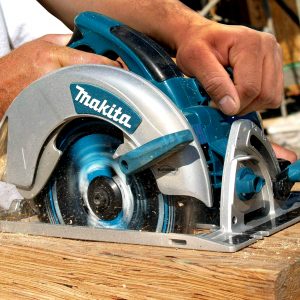Miter Saw vs Circular Saw: Differences in Design and Blades
Should I buy miter saw or circular saw? That is a frequent question for both beginners and experienced craftsmen, when they decide to create own workshop but can’t purchase all the necessary tools at once. For the novice master the best way is to borrow and try both. But if you read our miter saw vs circular saw comparison, it’ll definitely help you to make a good investment.
Table of Contents
Difference Between Miter Saw vs Circular Saw
A circular saw is a mobile and universal tool for manual rip cutting – making a long cuts in the grain direction or shorter cross cutting against the grain. With the proper blades you can also work with plywood, MDF, panels, etc. The tool come in both cordless and corded models. It is relatively cheap and you can often find circular saw in workshops and garages.
As you can see from the picture, circular saw is handheld power tool. It is relatively compact and mobile, but in order to keep the long cut straight or maintain an angle, you need to use special track or clamp down a straight edge guide.
Similar to circular saw, miter one use a flat circular blade to cut wood and other materials. But it also has special features to do accurate crosscuts. The tool can also cut bevel and “miters” – cuts at any angle other than 90°. Therefore, miter saw is a machine designed to make precise angled cuts quick and easy.
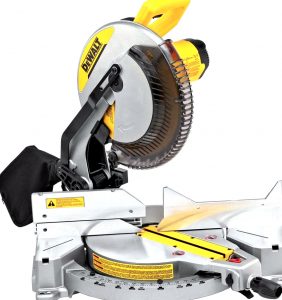
Technically speaking, the difference between a circular saw and a miter saw is in the miter guide frame. It allows you to make more complex and clean cuts, but as a result, the tool becomes more bulky and expensive.
Let’s Proceed to the Comparison: Miter Saw Versus Circular Saw
Circular Saw Pros |
Circular Saw Cons |
| It is a handheld tool, you can cut in a variety of angles and cuts – it is one of the most convenient workshop machines | You need to be careful, follow strict safety guidelines to avoid accidents |
| Convenient to make both long and short cuts. | The accuracy is average |
| More lightweight and inexpensive. The price can range from $40 to a compact one to $100 for a bigger tool. | More prone to produce tear-outs and fragmented edges due to the its toothed blade. Fine-tooth blades help a lot, but miter saw is better for trimming tasks. |
| Usually provide various blade adjustments to perform almost any cut type. | Working with circular saw is more difficult. More physical effort and attention is required for a quality cut |
| With angles and stops adjustment it can provide accuracy sufficient for most tasks. |
|
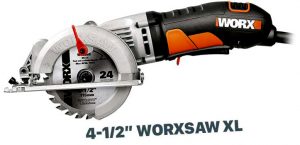
Miter Saw Pros |
Miter Saw Cons |
| Cuts are more precise | Not so versatile. It does only few types of (but very good) cuts but no more than that. |
| You can work quicker when making a lot of similar cuts | Occupies a lot of space and requires even more to work with long workpieces. |
| Convenient for stationary use and more expensive | Costs several times of the circular saw price – $200 to $600. But you could buy in used condition on ebay or at estate sales. |
| More safe to use, the blade only moves in an up/down direction within the adjustable range. | It’s a stationary device and you have to carry the material to the saw. Compact miter saw can be packed up into a car, but the circular saw can fit in most duffle bag. |
| Easily cuts cross cuts, bevels and miters | To extend the saw you need clamps and additional fencing to achieve stability. |
The Difference in Blades
The miter saw blade vs circular saw blade are similar in design. But usually circular and miter spin in different directions, therefore blades also have different directions pointed teeth.
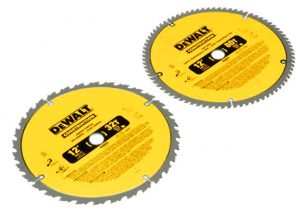
Both fit perfectly, however if you install them label up, the teeth will face the wrong way. The good news is that it is perfectly safe to just flip the blade over and use it perfectly safe 🙂 There are no differences between circular saw blade vs miter saw blade, what side the label is on means nothing. As long as the teeth pointed in the correct direction, the saw will work fine.
Note that purchasing and installing the correct size and type of blade on both circular and miter saw is important to your safety and performance.
For cutting hardwood and getting a nice clean edges try fine-toothed blades. They have a lot of smaller teeth, so they’ll cut easily through the tough material and with a nice edge on the cut. Note that these blades usually require more power.
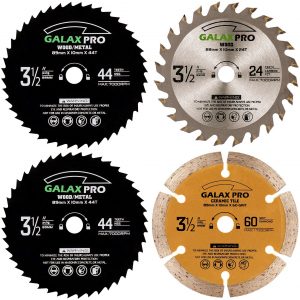
The type of cuts and blade types:
- Very coarse cut: fast cross cuts and rip cuts in hardwood, softwood and raw chipboards
- Coarse cut: the sampe plus formwork, boards and plywood
- Fine cut: the same plus parquet, chipboards laminated on one side and wood core plywood
- Very fine cut: the same plus MDF and fibre materials
How to Choose Right Blades For the Tool
Choosing the correct tooth type for miter saw will have the biggest impact on the material. The high teeth number and the thinness of the blade help to make accurate cuts in laminates and parquet.
Another factor to take in mind is the shape of the tooth. Some blades have alternate top tooth bevel. One tooth slopes one direction, and the next slopes in another. These teeth are designed for fast cuts, perhaps through rough wood.
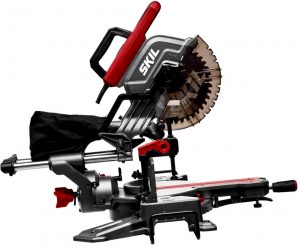
When choosing circular saw blades, be sure, what blade height is correct for your machine. The disk part of the blade is there to support the teeth and set correct cutting speed. Therefore, setting right blade will help to get the most from the blade and doesn’t put your saw under too much stress.
If the teeth of your blade just protrude from the cut about a couple of millimetres, they will be making good contact with cutting material at the correct angle. The tool will work at the best speed with less vibration and resistance.
Conclusions
If you are a beginner, my advice is to buy a circular saw first since it is the most versatile power saw you get. Use it for few projects, and either keep it, or sell it on craigslist. Yes, it’ll cost you $20-30 on it, but you saved some money by working yourself. The circular saw is pretty compact, so you can store it anywhere for occasional use. And it’s versatile enough to build a kitchen full of closets or wall of bookcases.
When your skills will become enough for more complex projects, buy a miter saw to take advantages of both devices. Use circular saw for rip-cuts and miter for precise trimming. Professional carpenters use their miter saw almost daily. It is the best pick the work involve making miters for cabinets and moldings.
Posted on Categories Power tools
